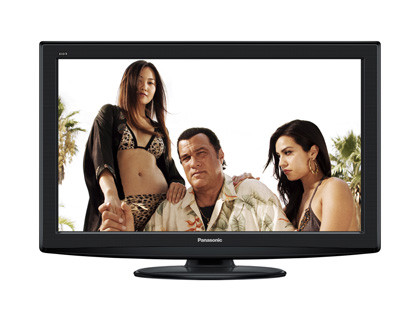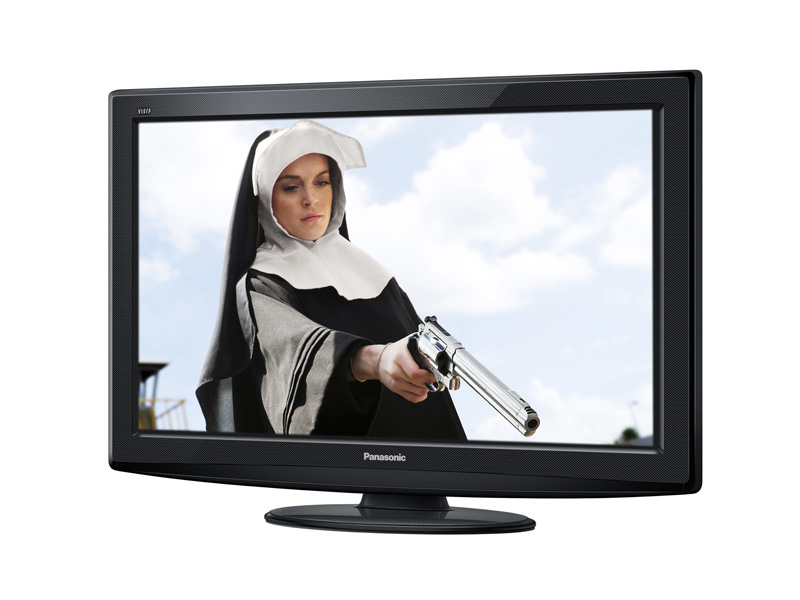Why you can trust TechRadar

Even in a decidedly budget package, picture quality should not be skimped on – something that's very easy to do in a world swamped by cheap LCD panels. Panasonic isn't one of them, and though it never reaches reference level, the TX-L32X20B provides pictures that appear unassailable value when compared to similarly priced sets.
In 4 HD's baffling The Event (from a Virgin V+ HD box) the President's sharp suits look dark while revealing just enough detail to convince – certainly more than you'd expect from an LCD TV at this price.
A desert scene reveals a lot of detail within a vista studded with natural-looking colours, with a quick camera pan not too troubling for the panel; motion blur is evident if you look for it, but it's never distracting. In practice, a 100Hz mode isn't missed too much, though if your diet is largely Blu-ray it's worth upgrading beyond the TX-L32X20B to Panasonic's G20 Series.
A close-up of Sean in hospital is equally compelling, with individual pores and beard follicles visible on a panel that's clearly been upgraded from last year's X10 Series. Not bad for a HD ready panel.
These impressions are drawn with the excellent contrast-heavy Cinema preset engaged. Similar strengths apply to the True Cinema setting, which, if reserved for blackout conditions, puts the TX-L32X20B's excellent contrast characteristics on show to stunning effect.
A special skill of the panel is the viewing angle; it makes almost no difference if you watch the TX-L32X20B from the wings, since contrast and colour remain virtually unchanged. Black areas of the image take on a bluish hue, but it's ever so slight.
Left on the dreaded Dynamic setting skin tones are off the mark and there's a strong purple bias to dark areas of the image. As always, it's best avoided.
Other tweaks are few, comprising just contrast, colour, brightness, sharpness, noise reduction and C.A.T.S – the latter being an ambient light sensor called Contrast Auto Tracking System, which can be set to either on or off. It's best left on if you're watching in bright conditions.
With Game mode engaged, images from an Xbox 360 hold up well, with little in the way of motion blur, though as on all LCD panels it's easy to detect some loss of resolution when the camera pans to follow a goal kick taken on Pro Evolution.
HD channels from a V+ box enjoy similar strengths to Blu-ray, and the TX-L32S20B's treatment of SD channels from its own tuner isn't bad, either. That same dollop of contrast and spot-on colouring gives pictures from BBC1 a rare boldness and clarity, though quick camera pans aren't as comfortable to watch as with HD.
The money saved on cutting-out features like DVB-T2, USB and Viera Cast has clearly been spent on providing this set with the best LCD panel possible; IPS Alpha has for a long time set a benchmark for wide viewing angles and decent contrast, and here's it's paired with some decent upscaling circuitry, too.
Both those facets continue here on what could be one of IPS Alpha tech's last hurrahs; the market for traditional CCFL-lit LCD TVs is in decline, with some predicting that more expensive LED-backlit sets will be all conquering within a year or two. With prices this low for a TV that offers more than enough detail, contrast and natural colouring for most living rooms, it's hard to see sets like the TX-L32X20B disappearing just yet.
Current page: Panasonic TX-L32X20B: Picture quality
Prev Page Panasonic TX-L32X20B: Features Next Page Panasonic TX-L32X20B: Sound, value, ease of useJamie is a freelance tech, travel and space journalist based in the UK. He’s been writing regularly for Techradar since it was launched in 2008 and also writes regularly for Forbes, The Telegraph, the South China Morning Post, Sky & Telescope and the Sky At Night magazine as well as other Future titles T3, Digital Camera World, All About Space and Space.com. He also edits two of his own websites, TravGear.com and WhenIsTheNextEclipse.com that reflect his obsession with travel gear and solar eclipse travel. He is the author of A Stargazing Program For Beginners (Springer, 2015),

